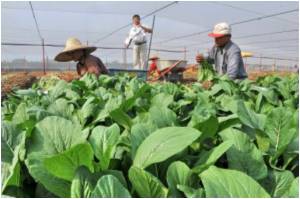UK's University of Leeds, in its new research, has found the industrialization of China as the culprit for increasing the fragility of global food supply. Apparently, reports are indicating that global grain markets are facing a breaking point.
Experts predict that if China's recent urbanisation trends continue, and the country imports just 5 percent more of its grain, the entire world's grain export would be swallowed whole.The knock-on effect on the food supply - and on prices - to developing nations could be huge.
Sustainability researchers have conducted a major study into the vulnerability of Chinese cropland to drought over the past 40 years, which has highlighted the growing fragility of global grain supply. Increased urban development in previously rich farming areas is a likely cause.
"China is a country undergoing a massive transformation, which is having a profound effect on land use," said Dr Elisabeth Simelton, research fellow at the Sustainability Research Institute at the University of Leeds, and lead author of the study.
"Growing grain is a fundamentally low profit exercise, and is increasingly being carried out on low quality land with high vulnerability to drought," she added.
The study looked at China's three main grain crops; rice, wheat and corn, to assess how socio-economic factors affect their vulnerability to drought.
Advertisement
They found that traditionally wealthy coastal areas are just as susceptible to drought as areas with poor topography in the east of the country.
Advertisement
If China were to start importing just 5 percent of its grain, the demand would hoover up the entire world's grain export. The pressure on grain availability for international grain markets could, in turn, have a huge knock-on effect.
Poorer countries are particularly vulnerable, as demonstrated by the 2007-2008 food crisis.
Published in the journal Environmental Science and Policy, the study used provincial statistics of harvests and rainfall together with qualitative case studies to establish the differences between land that is sensitive to drought and land that is not.
"One aim of this research is better understanding of the socio-economic responses to difficult conditions so that we can improve models of climate change," said Dr Simelton.
Source-ANI
TAN















